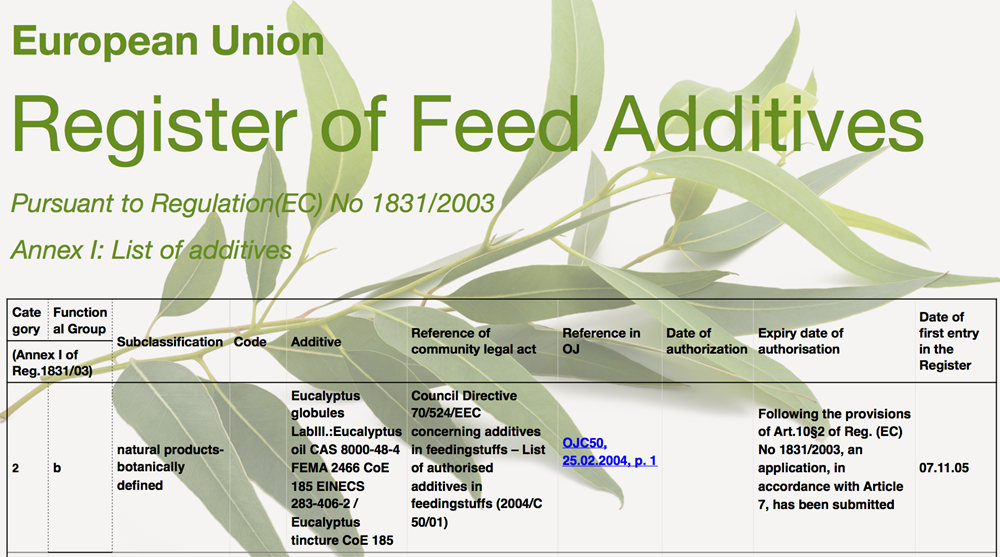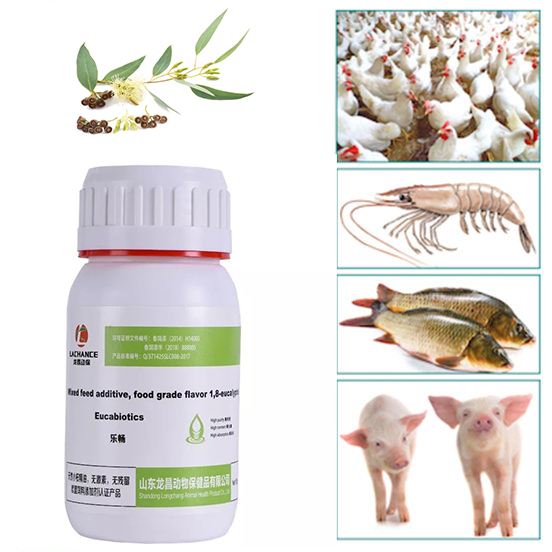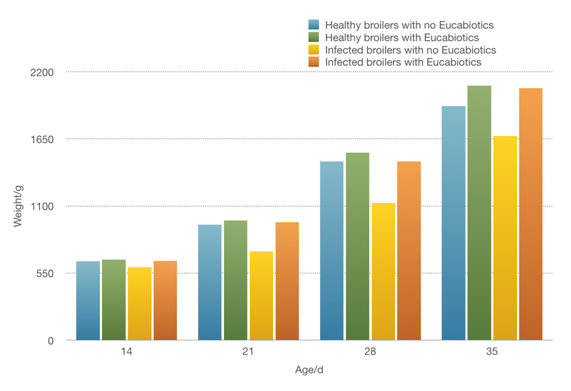Eucabiotics—Phytogenic feed additive (Australia Eucalyptus Oil)
Introduction:
Eucalyptus oil is registered in the European Union Feed Additive Catalogue

Lachance has developed an innovative product—Eucabiotics, with Eucalyptus oil being the main ingredient. The oil is extracted from natural wild eucalyptus leaves, which contains more than 85% active content 1,8-cineloe.
It has been proved that eucalyptus oil can restrain the growth of a large number of pathogens, protect the health of respiratory tract and intestines, improve growth performance and help animals to alleviate stress. Classified as phytogenic feed additives, Eucabiotics can be added daily with no harms or residuals.
Content:
Eucalyptus oil ≥ 10%
Functions:
• Directly kill bacteria, completely replace antibiotics
• Kill parasites, especially Eimeria spp
• Anti-immunological stress for vaccination
• Protect respiratory system
Dosage:
2-3kg/ton feed
Experiment:
1. The antibacterial effect of adding Eucabiotics
|
Species |
Antibacterial circle diameter (mm) |
|
Salmonella enteritidis S (ATCC13076) |
14.01 |
|
Shigella dysenteriae Z |
14.50 |
|
Salmonella pullorum C79-13 |
14.09 |
|
Escherichia coli BL21 |
12.38 |
|
Chicken E coli (wild strain) |
11.70 |
|
Staphylococcus aureus JN |
10.39 |
|
Listeria monocytogenes Lu |
14.09 |
The experiment shows that Eucabiotics has significant effects on inhibiting/killing Salmonella, Escherichia coli, Shigella and other pathogenic bacteria.
2. The effect of Eucabiotics replacing antibiotics on white-feather broilers
|
Growth Performance |
Basic diet |
Basic diet+antibiotics |
Basic diet+200mg/kg Eucabiotics |
|
Average initial weight (g) |
44±0.4a |
45±0.8a |
45±0.7a |
|
Average final weight (g) |
2145±34a |
2259±27b |
2333±30c |
|
Average weight gain (g) |
2101±35a |
2214±20b |
2288±22b |
|
Average feed intake (g) |
3221±50a |
3319±66b |
3377±47b |
|
FCR |
1.50±0.02a |
1.47±0.01ab |
1.45±0.03b |
|
Death and culling rate (%) |
5±3.4a |
3.3±2.1b |
1.7±1.7c |
|
EPI |
361±6a |
368±5a |
393±5b |
|
Diarrhea rate (%) |
7.9±2.6a |
3.9±2.5b |
3.7±2.3b |
The experiment shows that adding 200mg/kg Eucabiotics in the diet can increase body weight gain by 8.9%, decrease FCR by 0.05, increase EPI by 32 units, also, both death and culling rate and diarrhea rate are significantly decreased, achieving the same or even better effects compared with antibiotics.
3. The effect of Eucabiotics replacing coccidiostat on Ross 308—promoting body weight gain
The experiment shows that the body weight of healthy broilers can be increased when adding Eucabiotics in the diet; the growth performance of broilers infected with coccidia can be significantly improved when adding Eucabiotics, meaing the body weight can be returned to the normal level.
4.The effect of Eucabiotics on vaccination
| Age of birds (days) | NDV vaccinated and treated | NDV vaccinated and untreated | Unvaccinated negative control |
| 7 | 6.6±0.4a | 6.6±0.5a | 6.6±0.3a |
| 14 | 4.8±0.6a | 3.7±0.4b | 3.6±0.2b |
| 21 | 5.8±0.4a | 3.0±0.3b | 2.4±0.5c |
| 28 | 6.0±0.7a | 4.0±0.6b | 1.5±0.2c |
| Protection (%) | 35 | 25 | 0 |
Birds of group 1 and 2 are vaccinated against Newcastle disease at 7th and 14th day of age, at 28 days of age, 10 birds from each group are challenged with a velogenic viscerotropic train of Newcastle disease to test the effectiveness of the vaccine.
The experiment shows that the HI titers are higher in eucalyptus oils treated group compared to untreated group. The protection percentage in eucalyptus oils treated group is 10% higher than the untreated group when challenged with vvNDV.








